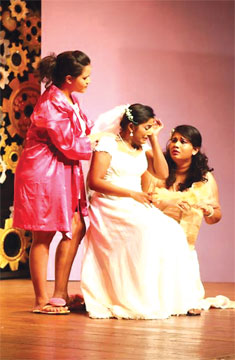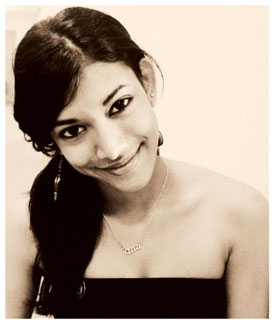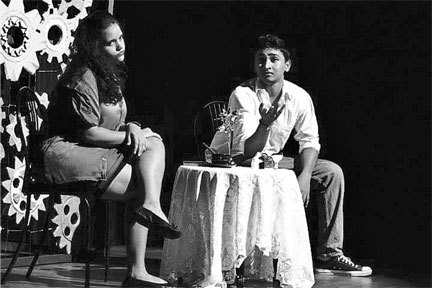Modes of ‘Time’ manifested through trajectories of ‘Motion’
A review of the theatre production ‘Time and Motion’:
By Dilshan BOANGE
|

A scene from Time and motion
|
Sri Lankans, when we go to the theatre want to be entertained, we
want to laugh. It’s in our nature to want to see things optimistically,
and feel a sense of positivism. And even plays that have a very serious
theme and subject must bring out some comic relief here and there, and
create some laughs.
These were some sentiments once expressed to me by Gihan de Chickera,
a face known from both the screen and stage. The validity of such views
can be tested by studying the success of plays staged in Sri Lanka and
how many runs they enjoy in the theatre circuits enticing viewers to
watch them over and over again.
Time and Motion
In this context one hopes the theatre production Time and Motion
staged on August 4 at the Lionel Wendt directed by a debutante drama
directress Anushka Senanayake and produced by Swasha Fernando and
Trinushka Perera, will not be hesitant to test the waters of audience
receptiveness by going on the boards with repeated runs.
Presented by an ensemble of notably young talent, this production
truly does show much optimism in terms of Sri Lanka’s scope of producing
another generation of Thespians to succeed, in time, to the mantle
created and being created, by the big names in contemporary Sri Lankan
theatre. Time and Motion was a medley of five short plays performed (in
sequential order) as –‘Sure thing’, ‘Restless in the restroom’, ‘Philip
Glass buys a loaf of bread’, ‘Variations on the death of Trotsky’, and
‘Yes and No, also known as, It works.’
The production’s holism
The unique and distinctness of the character and technique
demonstrated of each play showed the production’s holism. Each
performance held its ground and drove on its own merits of subject,
topic and mode of dramatisation and was not dependent on one other, yet
contributed to building a larger expression of how one may perceive the
relevance of ‘Time’ and its non retractable ‘motion’ that defines human
existence. The performances were line up of short plays written by
contemporary American playwright David Ives as well as Anushka
Senanayake herself.
Sure thing
In Sure thing the seemingly uncomplicated instance of a boy trying to
get acquainted with a girl sitting in a cafe reading a book is revealed
for the many complexities that can occur dependent on the mood and
moment of the people involved. The characters in this short play show us
that ‘people are human’ and the outcomes of conversation can be
different, depending on the approach and interaction that ensues and
also how ‘Time’ may work, or not on one’s side.
The technique employed showed that if humans were allowed to redo and
rerun and rewind their ‘motions’ at will, the application of ‘Time’
would be ‘rewritten’. And thus mistakes in life would of course never
really be a human possibility as one could simply ‘erase and write over’
whenever ‘time is up’ at a given attempt to reach an objective.
The sounding of a timekeeper’s bell marked a new moment between Bill
and Betty who finally do pair up to go to the movies despite all the
complexities of humanness they carry as two people yet to know each
other but having had their share of complication created by members of
the opposite sex and the indignations they cause in their respective
lives.
The symbolic Bill and Betty
|

Anushka Senanayake |
Bill and Betty are thus symbols and also representative of a desire
that can never come true –the instant ability to do certain things in
life over, erase the mistakes, as if they had never happened. The stage
is thus a space where one can see what we would direly wish to rectify
in our lives, governed by the rigidities of time and its irreversible
forward motion, achieved through time ‘reconstructed’, and made our
redeemer from our own bungling.
Resolutions in washrooms
Restless in the restroom had a sense of being something of a classily
done comical ‘chick lit’ scenario theatricalised to express how time may
hold a different value to people based on their perception and
conception of time’s ‘motion’ even if made to share a common space.
The action picks off in the ladies’ washroom in the ‘Cardamom Grand’
Hotel as Brenda the Bride, her Maid of Honour, she has been a TV
commercial model famed for a one time appearance in a butter
advertisement, an erudite bespectacled pretty girl on her way to an
interview with a visiting Harvard professor to secure a grad
scholarship, get locked in together and unleash a spiral of female
melodrama as Brenda bawls hysterically in classic bimbo blondness how
her fiancé is insensitive and uncaring of her feelings based on his
indifference to, and lack of recognition of, two certain shades of pink,
apparently rather notably distinguishable to the female senses according
to the Bride, her MOH and the former model.
With the eventual arrival of a shy man who mistakenly wanders in to
this very same ladies’ restroom and again allows the door to get shut,
revealing to be the ‘Professor Mendez’ with whom the given appointment
had by then been missed by the intellectual young woman, a providential
turn of ‘motion’, it seems, occurs to salvage the scholarship hopeful to
whom ‘time’ had not been kind.
‘Pink’ sensibilities
Although the classically superficial fusspot bimbo bride may seem to
make no ‘sensible’ argument in alleging her intended husband as
insensitive and unsympathetic to priorities in her life, the
counterargument could be that the ‘pinks’ concerned are meant to be
symbolic and representational of how a woman such as herself relates to
objects that bespeak her interiority.
The failure to see distinctions in those ‘colours’ could mean that
‘Shehan’ the fiancé, through his failure to see distinctions of two
symbols with marginally distinguishable difference, fails to grasp and
perceive a facet of Brenda’s interiority.
The likes of Shehan are thus in their ‘manliness’ unable to connect
with the ‘emotional being’ within the likes of Brenda. Food for thought,
one may say, when gauging how the seemingly superficial may speak of
divides between genders seeking expressionisms.
Pausing ‘Time’ for ‘Motion’
|

A scene from Time and motion |
‘Time’ and ‘Motion’ as concepts and phenomena took an entirely new
theatrical dimensionality in ‘Philip Glass buys a loaf of bread’. The
act built on a host of symbolic ‘motional’ elements as dance and jerky
repetitive verbalisation to signal deviation from chronology and
communication as perceived in conventionalism.
The intricacies involved in this performance required bodily
precision and dexterity to be ‘spot on’ and the players pulled it off
with great skill and ability which surely was the result of dedicated
rehearsals to ensure the smooth flow that seemed nothing short of
natural to the four players who should be applauded for the execution of
an act that entreated the audience to show sentential deconstruction and
reconstruction coupled with dance synchronisations could redefine time
and motion and present an altered version of reality.
Enter comrade Trotsky
The fourth short play, which was after the intermission is one that
could be thought of as a brilliant rightwing script theatricalised with
elements of the comic, the darkly comic, tragic, and also doleful.
Variations on the death of Trotsky can be thought of as tastefully
rightwing not because it creates a comicality out of the assassination
of exiled Soviet revolutionary Lev Davidovich Bronstein better known to
the world as Leon Trotsky, but since the play ‘humanly’ relooks at the
assassination which happened in Mexico of one of the most prolific
political figures of the 20th century who in the belief of upholding the
ideals of the Bolshevik revolution became Stalin’s most formidable
opponent in international communism.
The performance gives room to explore a possible alternative from a
hypothetical Trotsky built on the premise of humanism.
The humanisation of a Soviet leader as Trotsky as one who must be
sympathised with for fearing death and yearning for humanistic
understanding of why he was killed so brutally, makes the play’s
discussion one of critiquing leftist dogma. After all, orthodox Soviet
socialism rejects humanism as a specious machination of the capitalist
system to deprive the proletariat to become empowered.
Acts segmented by lighting
The variations were acts segmented by the control of lighting with
blackouts ending each ‘variation’, which at times left the audience in a
quandary as to whether the short play had ended towards the latter acts.
Yet the hilarity delivered by some of the acts at the inception came
to a definite halt when a doleful Trotsky after fully grasping the fact
that he is destined to die as written in history, says he would like to
take the time available to him to smell the flowers in his garden, a
simple act that makes him every bit human.
A masala mix of comedy
The finale showed ‘Time’ as a precious resource running out for young
Rahul Malhotra who must get married to escape a family curse that ends
the lives of the males who do not wed before turning twenty-one.
A hilariously rib-tickling short play Yes and No, also known as It
Works is an Indian scenario where masala bungling and Bollywood apery
are tenets that drive the comedy, making ‘Time’ also reflective of
generational changes in Indian society showing ancient traditional
beliefs and customs finding conciliation with modern technology.
The ‘foreseeing app’ of the sage ‘Rahagvan ji’ played entreatingly by
Wesleyite, Shazad Synon symbolised the modern day predicament of India
in the face of moving towards becoming a techno society; which through
comicality brings to question how much of Indian traditionalisms and
olden ways can survive without transpiring into something more
compatible with their westward modernism?
Creative veins
The jingle played over the sound system where a ‘tabla’ beat and
sitar stringing mixed chorusing of ‘Arranged-marriage-dot-com – it
works!’ in a typical Indian accent noticeably over enunciating the ‘r’
sound, every time someone mentions the ingenious website for solving the
dilemma of finding partners for young Indians, was simply a marvellous
theatrical device bespeaking the creative veins that had been at work on
the production.
Overall the production showed how a new vein of devising a theatrical
stage production could be conceptualised to fulfil the requirements of
entertainment as well as providing food for ponderous thought for those
who would like to see deeper running currents of profoundness woven in
the text of live performance, whilst not being a full length drama.
A matter of accents
There are, however, some notably accentuated points in the play where
the ‘elocutionary element’ brought out a not very naturalistic Sri
Lankan verbal output. This was most notable in the first play Sure thing
where both Bill and Betty had markedly accented dialogues. The screechy
bathroom bound bride Brenda too brought out a notable accented manner of
speech that hinted of an elocution class trained student.
Interestingly Rahul Malhotra who was played by the young actor who
played Bill in ‘Sure thing’ had switched to a very Sri Lankan manner of
speaking in English which while is very unlike the typical Indian, also
makes one wonder if Sure thing was meant to actually represent two
people in a Parisian cafe and not made to be taken in a Sri Lankan
context. In which case the question arises of whether the gamut of
complexities that were unveiled in the trial and error ‘chatting up’
scenario was actually meant to represent the western mindset?
Philip, the plainly clothed
Very clearly the young directress had a talented troupe of actors
bringing her directorial vision to life. Past Peterite Kanishka Herat
who delivered a praiseworthy performance last year in See how they run
playing the Bishop of Lax, was in a very new mould of impressive
‘agility and motion’ as Philip Glass; as were the others players in that
short play.
Yet one could not help but notice how while much attention had gone
into the wardrobe department in all actors, Kanishka, in his role,
costume wise, appeared very much the average young man going home after
office, with his sleeves rolled up. Costume wise Philip Glass was plain
and stood out in that plainness.
Beardless Trotsky
Unless some space for ‘meaning mapping’ of the character was intended
on the face of the player who brought to life the character of Trotsky,
the directress is not too likely to win the admiration of any Trotskyite
for presenting the proponent of ‘Eternal revolution’ ‘clean shaven’ and
devoid of his signature goatee and moustache. How this image defining
detail of Trotsky was overlooked in a production that evinces much hard
work and effort having been invested in art direction is rather
baffling.
The props and stage sets used served a tastefully utilitarian end.
The different sets seemed neither economically minimalistic nor showily
superfluous and evinced a very well devised and executed production from
its logistical aspects as well.
Time and Motion was a very welcoming newness to the theatre scene in
Colombo and one hopes the rousing applause that erupted at the curtain
call will resonate as a ‘calling’ to the talented group of young
artistes to further unveil their theatrical talents on stage, in days to
come. |

